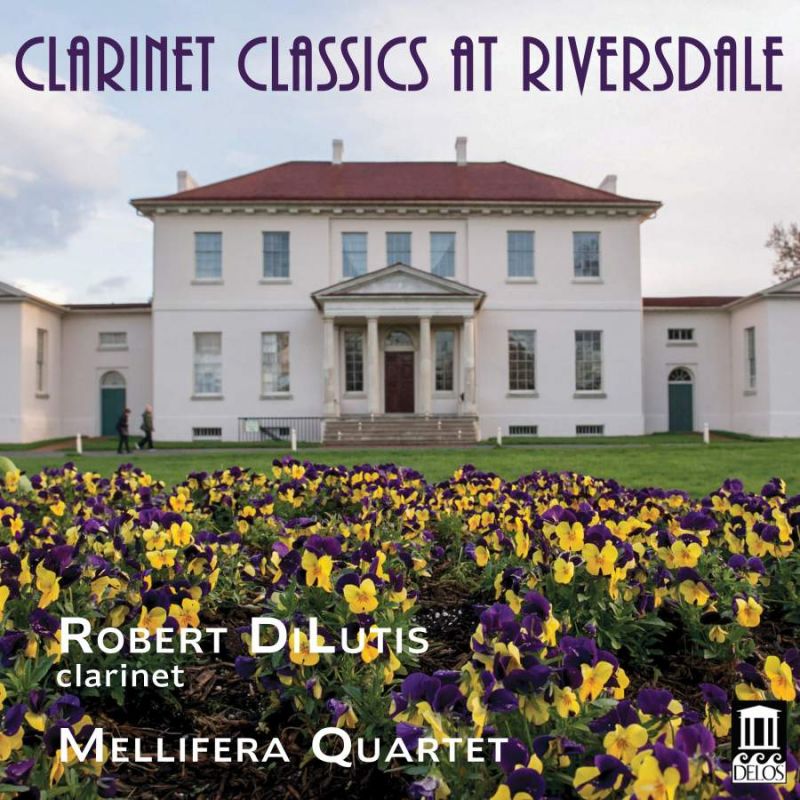Clarinet Classics at Riversdale (Robert DiLutis)
View record and artist detailsRecord and Artist Details
Composer or Director: Carl Maria von Weber, Alexander Konstantinovich Glazunov, William Osborne, Miklós Rózsa, Heinrich (Joseph) Baermann, (Sigurd Christian) Erland von Koch
Genre:
Chamber
Label: Delos
Magazine Review Date: 10/2019
Media Format: CD or Download
Media Runtime: 60
Mastering:
DDD
Catalogue Number: DE3561

Tracks:
| Composition | Artist Credit |
|---|---|
| Clarinet Quintet No 3, Movement: Adagio |
Heinrich (Joseph) Baermann, Composer
Heinrich (Joseph) Baermann, Composer Mellifera Quartet Robert DiLutis, Clarinet |
| Rêverie orientale |
Alexander Konstantinovich Glazunov, Composer
Alexander Konstantinovich Glazunov, Composer Mellifera Quartet Robert DiLutis, Clarinet |
| Monolog 3 |
(Sigurd Christian) Erland von Koch, Composer
(Sigurd Christian) Erland von Koch, Composer Robert DiLutis, Clarinet |
| Rhapsody |
William Osborne, Composer
Robert DiLutis, Clarinet William Osborne, Composer |
| Sonatina for solo clarinet |
Miklós Rózsa, Composer
Miklós Rózsa, Composer Robert DiLutis, Clarinet |
| Quintet for Clarinet and Strings |
Carl Maria von Weber, Composer
Carl Maria von Weber, Composer Mellifera Quartet Robert DiLutis, Clarinet |
Author: Guy Rickards
Weber’s Clarinet Quintet (1811 15) is the major item, described aptly by DiLutis in his booklet essay as ‘for clarinettists a dream come true’ – confirmed by the dozens of recordings currently available. While the present couplings for it are unique (Weber’s concertos or the Mozart Quintet are more usual), this recording is definitely competitive, beautifully played by DiLutis and accompanied in exemplary fashion by the Mellifera Quartet. Weber composed it for Heinrich Baermann, a gifted – if minor – composer in his own right, represented here by the wistful Adagio from his Third Quintet. It is a shame the entire work could not be included, though this movement enjoys a separate existence. The final ensemble piece is Glazunov’s Rêverie orientale (1886), a lovely inspiration which is confused in the track-listing with the later – and much shorter – Rêverie for horn, Op 24 (1890).
The three unaccompanied pieces are every bit as rewarding. Rózsa’s Sonatina, Op 27 (1951), is a hugely involving diptych comprising a theme and variations followed by a gypsy dance, the whole oozing Hungarian atmosphere. Erland von Koch’s Monolog 3 (1973), the third of a series of 17 for different instruments, is another diptych, cooler in temperature but no less passionate. The Rhapsody (1952) by William Osborne (1906 79) is a real find, based on an old Asian melody (a touch after Hovhaness’s manner) and also exists in a version for bassoon.
Discover the world's largest classical music catalogue with Presto Music.

Gramophone Digital Club
- Digital Edition
- Digital Archive
- Reviews Database
- Full website access
From £8.75 / month
Subscribe
Gramophone Full Club
- Print Edition
- Digital Edition
- Digital Archive
- Reviews Database
- Full website access
From £11.00 / month
Subscribe
If you are a library, university or other organisation that would be interested in an institutional subscription to Gramophone please click here for further information.




